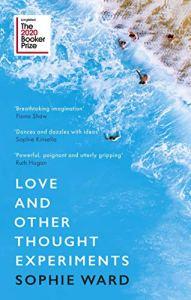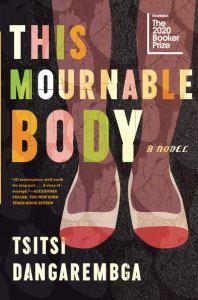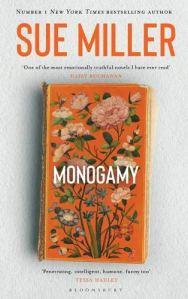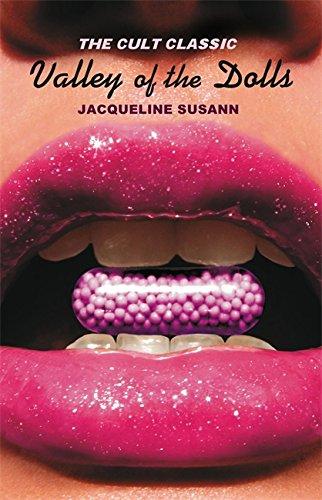Welcome to the my latest reading round-up. I soon realised that covering four books a week would be a stretch once I’d cleared my backlog (I read fast, but not that fast, and if everything was worth recommending there wouldn’t be much point to this) – so I hope you’ll continue to join me ‘as and when’. Today the spotlights falls on three current titles and the 1966 cult classic Valley of the Dolls.

This debut was long-listed for the Booker Prize but I think it deserved to go further. There are several possible reasons it didn’t but whether or not this is one of them, there seems to be a suspicion or fear of anything intellectual in British culture – in marked contrast to that of France, my personal counter-reference. Maybe more than ever, on the premise that anything too clever somehow equates to ‘elitism’ (which ironically reinforces prejudice about what kind of people might understand or appreciate what). This novel weaves together stories on the theme of love with philosophy, each chapter illustrating a quoted Thought Experiment in inventive ways. I’m not sure I’ve read anything that kept knocking me sideways like this – from the technically brilliant structure to the character trajectories via abstract ideas fleshed out with great empathy – my lack of detail is deliberate or I’d be depriving you of that. It impressed me, moved me and shocked my brain back into action – this is a book that made me excited about what fiction can achieve.

This title by Zimbabwean author and anti-corruption activist Tsitsi Dangarembga has made it a stage further, to the Booker shortlist, and offers a bleak and uncompromising picture of that country through the voice of Tambudzai, a single middle-aged woman struggling to find her place, who addresses herself as ‘you’. I didn’t love this novel the way some friends have, but I did find it eloquent and eye-opening, layering perspectives including the scars of colonialism, white privilege, corruption and engrained misogyny. It’s often brutal and disturbing – pain is its central preoccupation, after all – but not relentlessly so; Tambu herself evokes mixed feelings to say the least. I didn’t discover until afterwards that this is the final volume of a trilogy and suspect I’d have got more out of it having read the others (readers are divided on this) – fortunately, I have someone who could fill me in on the political background. A worthy contender for the prize.
(You can read my review of another shortlisted title, Real Life by Brandon Taylor here.)

How had I not even heard of American bestselling novelist Sue Miller? I loved her writing and her wisdom about family and relationships in this book and will be seeking out her backlist. It’s down to the striking title that this happened at all. Monogamy is a subject I find fascinating: such a nice idea, so difficult in practice. Is it natural? Is it just a social construct? (I get into all this in my debut novel Paris Mon Amour). One thing’s for sure, when a novel’s called Monogamy, it’s guaranteed not to be about that. Sue Miller creates a complex and compelling set-up of middle-aged characters (you get points for that in my world) in which the current (Annie) and ex-wife (Frieda) of bookstore owner Graham figure alongside their respective adult children by him. It’s a ‘quiet’, character-driven novel, punctuated by moments of searing insight on betrayal, grief and the sudden changes of direction life can involve. If this is your kind of thing, I recommend it highly.

This novel, published the year before I was born, was the original blockbuster and has sold over 30 million copies. I’d been meaning to read it based on its mythical reputation alone – I knew little else about it – all my adult life, so when a dog-eared copy turned up at the charity bookshop where I work it felt like a sign. It’s one of those books I always assume everyone else has read but when I mentioned it on Twitter many hadn’t (same as The Great Gatsby a few years ago), and the rest were keen to know if I thought it had stood the test of time.
I have to say – with respect to the late Jacqueline Susann and her extraordinary legacy – this long book following the lives of three very different American women in the world of showbusiness and modelling is not one I’d rate highly on the usual criteria – it was a relief to discover that it’s widely considered trashy, which was my feeling. That’s not a dealbreaker but the first half nearly was, so slow I nearly gave up about ten times (it was the thought of admitting defeat and not seeing what other people find so significant that kept me going). I’m glad, because it picked up considerably, I relaxed into it on its own terms and there’s no doubt that it’s the springboard for endless reflection and debate on societal change – it’s set over the two decades post 1945; sexual equality, double standards, drug culture (the Dolls of the title refer to the barbiturates liberally shoveled down by the protagonists) and whether and in what way it can be viewed, even retrospectively, as a feminist work. This, to me, is the takeaway that makes it worth having read.
So does it stand the test of time? My original answer was going to be ‘yes and no’ but actually, it’s a yes. Even the ways in which it feels dated contain aspects still relevant in 2020. For example: we’d now baulk at the idea that a talented woman needs the patronage of a mediocre man to make it, but the skewed dynamic between those two camps is still exhaustingly familiar. It’s not hard to imagine the sensation VOTD caused with its very frank female perspectives on sex and sexuality, ambition, beauty and objectification, aging etc; much has changed, but are these things now discussed openly and treated on an equal footing with men? I don’t think so. In some respects this novel is more pertinent than ever in an era of obsession with celebrity; erosion of privacy and sexual misconduct. At least now I know what all the fuss is about.
Have you read any of these, or anything else you’d recommend lately?

